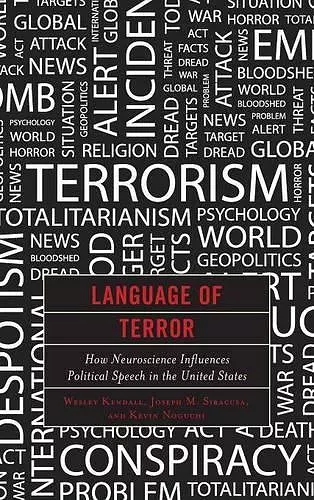Language of Terror
How Neuroscience Influences Political Speech in the United States
Joseph M Siracusa author Wesley Kendall author Kevin Noguchi author
Format:Hardback
Publisher:Rowman & Littlefield
Published:6th Mar '15
Currently unavailable, and unfortunately no date known when it will be back

Building on the emerging field of biopolitics of security, this research monograph demonstrates that political speech can be crafted to manipulate segments of the voting population who are inherently predisposed to being receptive to certain language. The authors, who come from both political science and behavioral neuroscience, examine how the human brain reacts to expressions of political ideology regarding terrorism. They apply these reactions to specific forms of political communication, many of which are designed to elicit a desired response in creating support for a policymaker’s agenda. By comparing and contrasting a variety of case studies, they demonstrate how similar acts accompanied by starkly different political language can create cognitive dissonance in the minds of the electorate and influence policy choices. Each chapter analyzes the content of a speech, its assimilation by different political groups, and two case studies. For example, the case of Luis Posada Carriles, a Cuban exile and former CIA agent responsible for the bombing of a Cuban airliner in 1976 is examined alongside that of Mohamed El Megrahi, the Libyan intelligence officer convicted of the bombing of Flight 103 over Lockerbie, Scotland in 1988 This unique study uses new research in neuropsychology to demonstrate how the American public’s response to various policies on terrorism is manipulated, highlighting the impact of ideological speech regarding terrorism—the “language of terror.”
[Language of Terror:] How Neuroscience Influences Political Speech in the United States provides an intriguing blend of science and political analysis with a dose of linguistics added to the mix, and will delight college-level readers in all disciplines who are also interested in insights about terrorism and security. It's a research piece that considers how political speech can be used to influence voters through behavioral approaches, and it considers specific kinds of political approaches and communication routines that have been crafted to elicit selected responses from audiences. In the process of explaining and exploring this, each chapter offers a speech, analyzes its content, and pairs it with two case studies considering its impact. The result is a study no college-level communications or political science collection should be without. * Midwest Book Review *
The book...presents an important methodological contribution to examining the neuroscience that underlies the use of political language in society. * Perspectives on Terrorism *
Kendall, Siracusa, and Noguci wrote a tour de force on the role of language in understanding terrorism. In particular, the authors break new ground by looking at how thoughts—which lie within our gray matter and which are ultimately expressed through language—have a lot to do with the terrorist’s personality, ideology, and motivation. I urge experts and non-experts alike to read The Language of Terror: Neuroscience and Political Language in the U.S. War on Terrorism, as this book offers a unique but important approach to better understand—and, hopefully, prevent wars and conflicts across the globe. -- Jonathan Matusitz, associate professor, University of Central Florida, Nicholson School of Communication
ISBN: 9781442235823
Dimensions: 236mm x 161mm x 19mm
Weight: 390g
168 pages